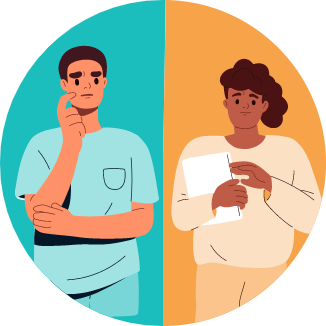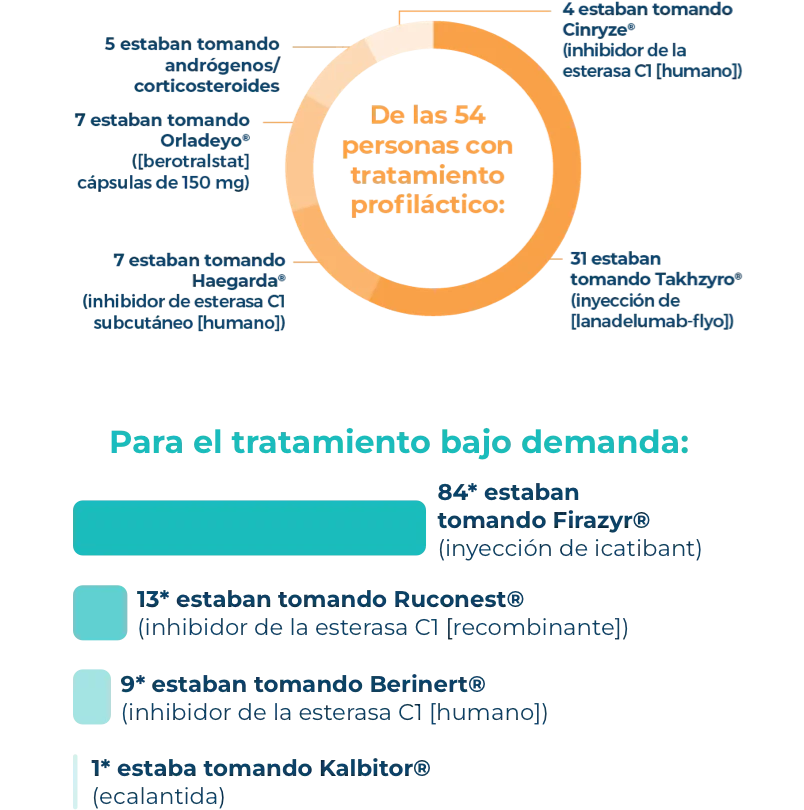¿Cómo se compara su experiencia con el proceso del ataque?
Responda 5 preguntas para ver si su experiencia es similar a la de la Encuesta de HAE Attack Journey.
INICIAR LA experienciaResponda 5 preguntas para ver si su experiencia es similar a la de la Encuesta de HAE Attack Journey.
INICIAR LA experiencia
LA ENCUESTA DE HAE ATTACK JOURNEY ENTREVISTÓ A PERSONAS CON AEH CON EL OBJETIVO DE COMPRENDER:


En ocasiones, las personas con AEH retrasan el tratamiento bajo demanda o deciden no tratar un ataque de AEH. La Encuesta de Attack Journey ha revelado que a muchas personas con AEH les resulta difícil llevar su tratamiento bajo demanda y luchan con la ansiedad de si deben tratarse o no cuando reconocen un ataque. La falta de privacidad necesaria para administrar el fármaco, preferir tratarse en casa, y el miedo a la inyección o al dolor del fármaco son 3 de los motivos más frecuentes para retrasar el tratamiento.
54/107
tratamiento
profiláctico

53/107
solo tratamiento
bajo demanda

21 hombres
y
86 mujeres
participantes

56 personas de
<40 años
y 51
que tenían
≥40 años
La Encuesta de HAE Attack Journey fue realizada por KalVista Pharmaceuticals en asociación con la comunidad del AEH para comprender mejor cómo las personas con AEH planean un ataque, toman decisiones sobre el tratamiento bajo demanda y cómo afectan los ataques a su calidad de vida. Esta encuesta se basó en los hallazgos de una encuesta preliminar anterior (N = 32), que reveló que la mayoría de las personas con AEH continúan experimentando un proceso de ataque prolongado, a pesar de los avances en el tratamiento.
La encuesta se realizó en línea entre abril y octubre de 2022 y en ella se plantearon preguntas a 107 miembros de la Hereditary Angioedema Association sobre los ataques de AEH y su experiencia actual con el tratamiento bajo demanda.


*En el caso de Firazyr, 44 pacientes recibían tratamiento profiláctico y bajo demanda, y 40 recibían solo bajo demanda; en el caso de Ruconest, 3 pacientes recibían tratamiento profiláctico y bajo demanda, y 10 recibían solo bajo demanda; en el caso de Berinert, 6 pacientes recibían tratamiento profiláctico y bajo demanda, y 3 estaban tomando solo bajo demanda; para Kalbitor, 1 paciente estaba recibiendo tratamiento profiláctico y bajo demanda, y 0 estaban tomando solo bajo demanda. Cinryze, Firazyr, Kalbitor y Takhzyro son marcas comerciales registradas de Takeda o sus filiales. Berinert y Haegarda son marcas comerciales registradas de CSL Behring GmbH. Orladeyo es una marca comercial registrada de BioCryst Pharmaceuticals, Inc. Ruconest es una marca comercial registrada de Pharming Intellectual Property, B.V.
Preparación para el ataque:
Las personas con AEH pierden oportunidades de tratar los ataques a tiempo
RECONOCIMIENTO DEL ATAQUE:
LAS PERSONAS CON AEH PUEDEN RECONOCER DE MANERA SISTEMÁTICA EL INICIO DE SUS ATAQUES
Toma de decisiones:
A PESAR DE RECONOCER EL
INICIO DE UN ATAQUE DE AEH, CASI TODOS LOS ENCUESTADOS RETRASAN
EL TRATAMIENTO BAJO DEMANDA
RESOLUCIÓN:
RETRASAR EL TRATAMIENTO BAJO DEMANDA AFECTÓ A LA INTENSIDAD DE LOS ATAQUES Y AL TIEMPO DE RECUPERACIÓN
Únase a la conversación y sea el primero en conocer las próximas actualizaciones.
PUBLICACIONES DEL RECORRIDO DEL ATAQUE DE AEHReferencias: 1. Valerieva A, van Kooten S, Heckmann M, Danese S, Goga L, Longhurst H. Patients delay treating hereditary angioedema (HAE) attacks with currently available, injectable, on-demand therapies. Resumen presentado en: EAACI 2023 Hybrid Congress, 9-11 de junio de 2023; Hamburgo, Alemania. Allergy. En prensa. 2. Betschel S, van Kooten S, Heckmann M, Danese S, Goga L, Guilarte M. HAE Patients Decision to Carry On-demand Treatment When Away from Home. Resumen presentado en: 13th C1-inhibitor Deficiency Angioedema Workshop, 4-7 de mayo de 2023; Budapest, Hungría. Allergy Asthma Clin Immunol. En prensa. 3. Grumach A, van Kooten S, Heckmann M, Danese S, Goga L, Garcez T. Understanding the complex decision-making associated with on-demand treatment of hereditary angioedema (HAE) attacks. Resumen presentado en: EAACI 2023 Hybrid Congress, 9-11 de junio de 2023; Hamburgo, Alemania. Allergy. En prensa. 4. Burnette A, Anderson J, Longhurst H, et al. Anxiety associated with parenteral on-demand treatment for hereditary angioedema (HAE). J Allergy Clin Immunol. 2023;151(2):AB141. doi:10.1016/j.jaci.2022.12.441 5. Datos de archivo. KalVista Pharmaceuticals, Inc. 2023.

Volver arriba